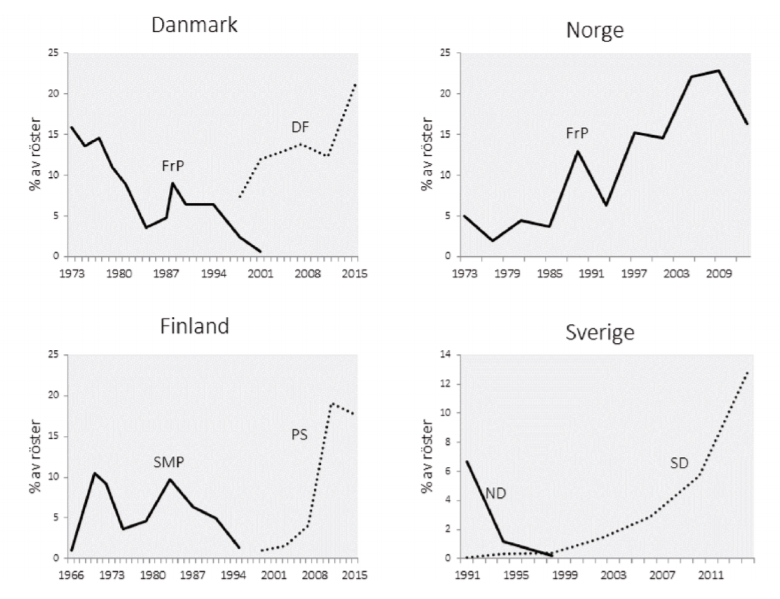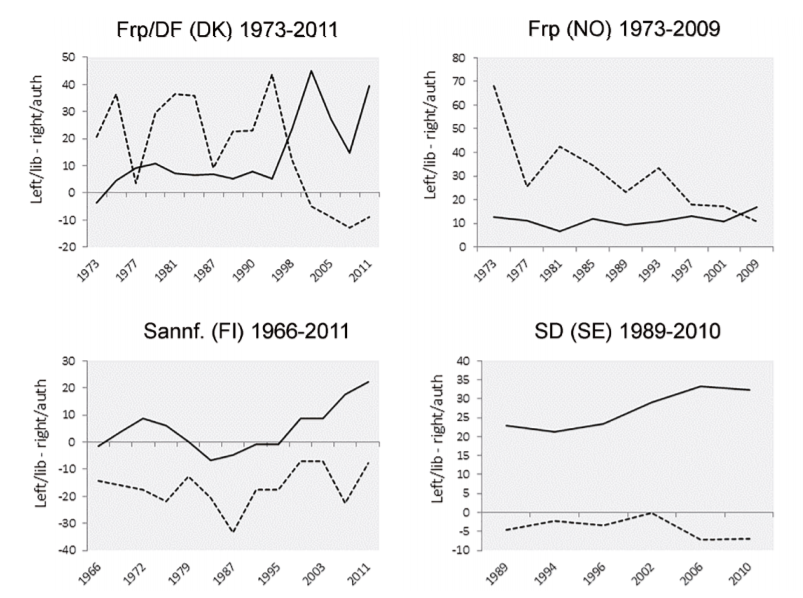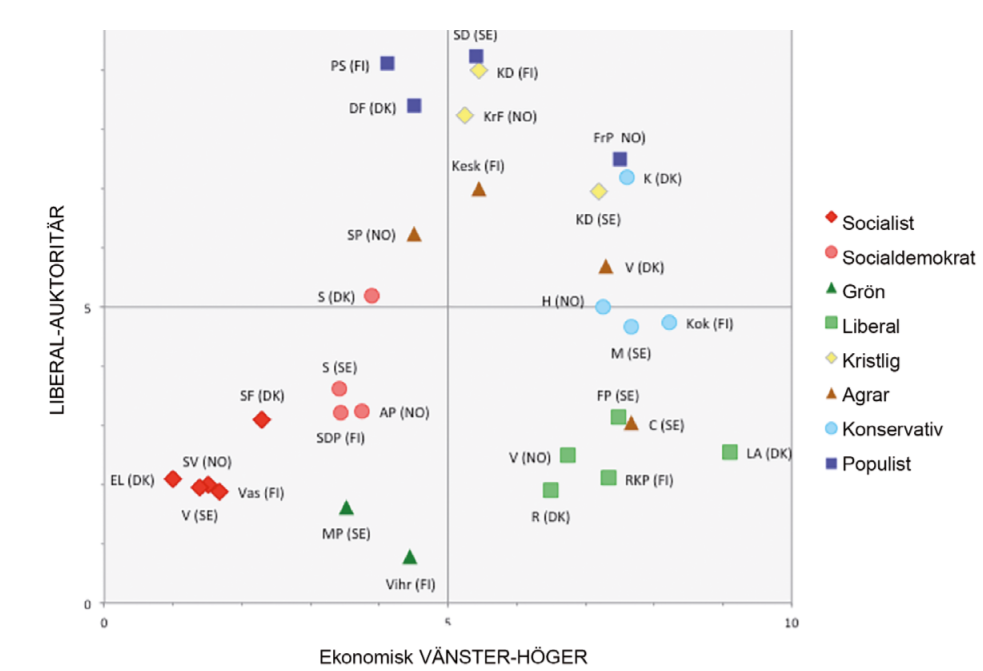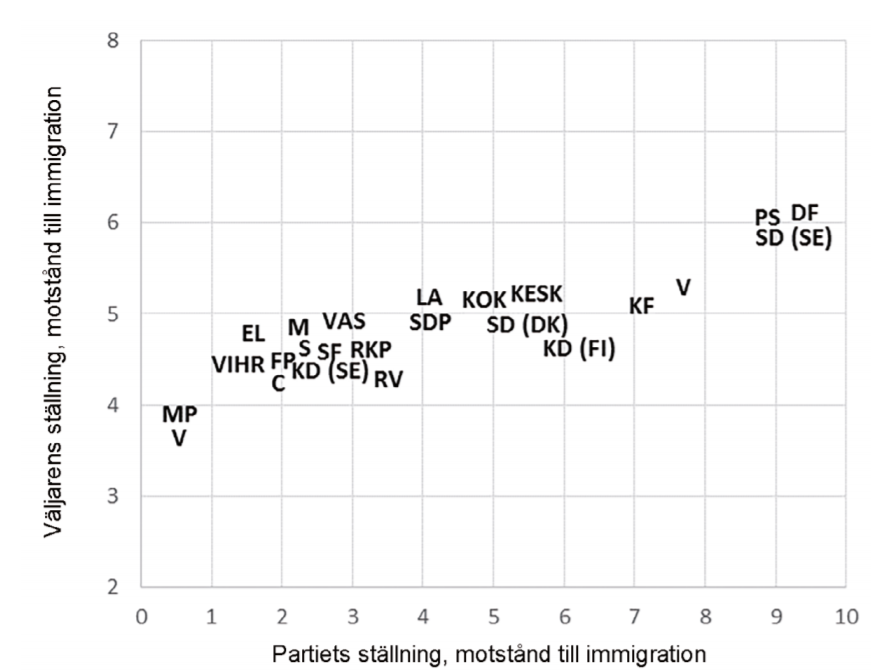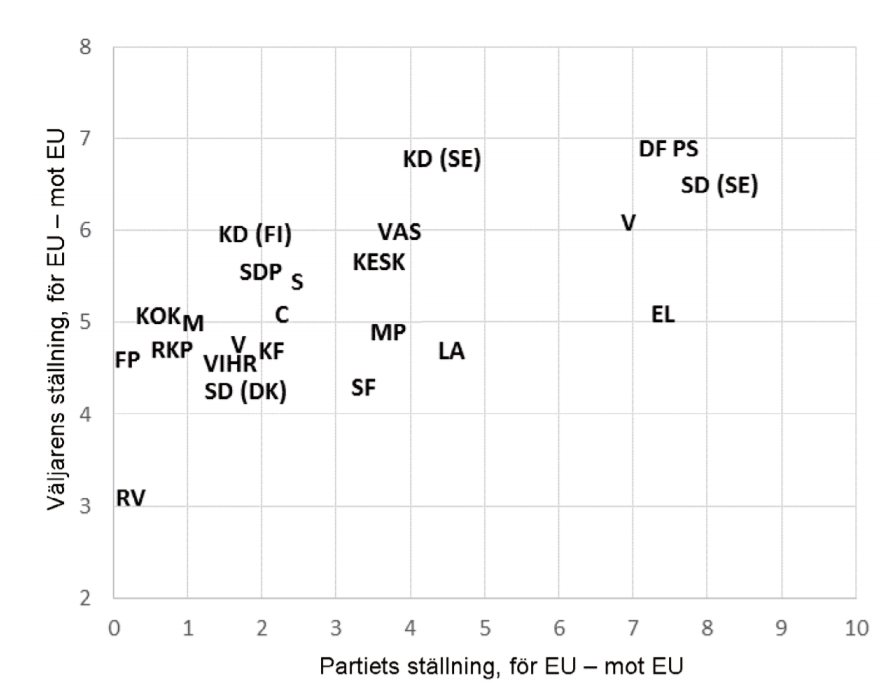Aardal, Bernt (2016): Hjemmeside
www.aardal.info / www.uio.no/valgforskning, (Accessed 2016-06- 14).
Arter, David: ”Black faces in the blond crowd: Populist racialism in Scandinavia.” Parliamentary Affairs 45.3 (1992): 357-372.
Arter, D. (2010): The Breakthrough ofAnother West European Populist Radical Right Party? The Case of the True Finns. Government and Opposition 45(04): 484–504.
Art, D. (2011): Inside the radical right: The development of anti-immig- rant parties in Western Europe. Cambridge University Press.
Backlund, A, (2016): ”Isolation and Policy Co-optation: The Path Dependency of the Swedish Cordon Sanitaire”. Paper presented at the annual conference of the Swedish Political Scence Association (SWEPSA) in Visby, October 19-21, 2016.
Bakker, R., Jolly, S. & Polk, J. (2012): Complexity in the European party space: Exploring dimensionality with experts. European Union Politics 13(2): 219–245.
Bakker, R., Vries, C.D., Edwards, E., Hooghe, L., Jolly, S., Marks, G., … Vachudova, M.A. (2012): Measuring party positions in Europe: The Chapel Hill expert survey trend file, 1999-2010. Party Politics. Retrieved from http://ppq.sagepub.com/cgi/doi/10.1177/1354068812462931 Bengtsson, Åsa, et al: The Nordic voter: myths of exceptionalism. ECPR Press, 2013.
Benoit, K. & Laver, M. (2006): Party policy in modern democracies.
Taylor & Francis.
Berglund, S. & Lindström, U. (1978): The Scandinavian party system(s): a comparative study. Lund: Studentlitteratur.
Bergmann, E. (2015): Populism in Iceland: Has the Progressive party turned populist?. Icelandic Review of Politics and Administration. 11(1):33-54
Bjørklund, T. & Bergh, J. (2005): Innvandrerne i lokalpolitikken. En suksesshistorie? In J. Saglie & T. Bjørklund (eds.), Lokalvalg og lokalt folkestyre. Gyldendal Akademisk.
Loxbo, Karl, and Niklas Bolin: ”Party organizational development and the electoral performance of the radical right: exploring the role of local candidates in the breakthrough elections of the Sweden democrats 2002–2014.”
Journal of Elections, Public Opinion and Parties 26.2 (2016): 170- 190.
Canovan, M. (1999): “Trust the People! Populism and the two faces of democracy” in Political Studies 47(1): .2-16.
Converse, P.E. & Dupeux, G. (1962): Politicization of the Electorate in France and the United States.
Public Opinion Quarterly 26(1): 1–23.
Christiansen, F. J. and Pedersen, R. B. (2012): The Impact of the European Union on Coalition Formation in a Minority System: The Case of Denmark.
Scandinavian Political Studies, 35: 179–197.
Dansk Folkeparti. (2002): Principprogram [Program of principles]. De Lange, S.L. (2007): ANew Winning Formula?The Programmatic Appeal of the Radical Right. Party Politics 13(4): 411–435.
Demker, Marie, and Lars Svåsand: Partiernas århundrade. Fempar- timodellens uppgång och fall i Norge och Sverige. Santerus förlag, 2005.
Demker, M (2012): Positiv attityd till invandring trots mobilise- ring av invandringsmotstånd i Lennart Weibull, Henrik Oscarsson & Annika Bergström (red) I framtidens skugga. Göteborgs universitet: SOM-institutet
Downs, W.M. (2001). Pariahs in their midst: Belgian and Norwegian parties react to extremist threats. West European Politics 24(3): 23–42. Erlingsson, G.Ó.,Vernby, K. & Öhrvall, R. (2014): The single-iss- ue party thesis and the Sweden Democrats.Acta Politica 49(2): 196–216. Financial Times (17-6-2015): ’Sick Finland ready for austerity med- icine, says Alexander Stubb’. http://www.ft.com/intl/cms/s/0/fb55b4f2-14fc-11e5-9509-
00144feabdc0.html#axzz3dmlUxjqc accessed 21-6-2015. Flanagan, S.C. & Lee,A.R. (2003): The New Politics, Culture Wars, and theAuthoritarian-Libertarian Value Change inAdvanced Industrial Democracies. Comparative Political Studies 36(3): 235–270.
Fremskrittspartiet. (2009): Fremmskrittspartiets prinsipper 2009-
2013 [The Progress Party’s principles 2009-2013].
Fryklund, B. & Peterson, T. (1981): Populism och missnöjespartier i Norden: studier av småborgerlig klassaktivitet. Lund: Lund University. Geys, B., Heyndels, B. & Vermeir, J. (2006): Explaining the formation of minimal coalitions: Anti-system parties and anti-pact rules. European Journal of Political Research 45(6): 957–984.
Heinisch, Reinhard: ”Success in opposition–failure in government: explaining the performance of right-wing populist parties in public office.” West European Politics 26.3 (2003): 91-130.
Hooghe, L., Marks, G. & Wilson, C.J. (2002): Does Left/Right Structure Party Positions on European Integration? Comparative Po- litical Studies 35(8): 965–989.
Ivarsflaten, E. (2006): Reputational shields:Why most anti-immigrant parties failed in Western Europe, 1980-2005.
Presented at theAnnual Meeting of theAmerican Political Science Association, Philadelphia.
Jagers, J., & Walgrave, S. (2007): Populism as political communi- cation style: An empirical study of political parties’ discourse in Belgium. European Journal of Political Research 46(3), 319–345
Jungar, A.-C. & Jupskås, A.R. (2011): Centre-Authoritarian Po- pulists in the Nordic Countries: ANew Party Family?
Presented at theTriennial congress of the Nordic Political Science Association (NoPSA) in Vasa, Finland 9-12 August 2011.
Jungar,A.-C. & Jupskås,A.R. (2014): Populist Radical Right Parties in the Nordic Region: ANew and Distinct Party Family?
Scandinavian Political Studies 37(3): 215–238.
Jungar,A-C. (2015a): BusinessAs Usual: Ideology and PopulistAppeals of the Sweden Democrats.
In T. Pappas & H-P. Kriesi (Eds.), Populism In The Shadow of the Great Recession. Colchester: ECPR Press.
Jungar, A-C. (2015 b): Agrarian populism in Finland.
In Strijker, Dirk, Voerman Gerrit & Terlin, Ida (eds) Rural protest groups and populist parties, Wageningen Academic Publishers Jungar, Ann-Cathrine (2017): The Sweden Democrats: Adjusting the organisation to electoral growth and parliamentary breakthrough in R. Heinisch and O. Mazzoleni (eds.) Understanding Populist Party Organization: A Comparative Analysis, Houndmills: Pal- grave Macmillan
Jungar,Ann-Cathrine (2016): TheTrue Finns: From the Mainstream to the Margin? in Akkerman, de Lange, Rooduijn Radical Right
Wing Parties in Western Europe: Into the Mainstream?, London and New York:Routledge.
Jupskås, A. (2009): Høyrepopulisme på norsk. Historien om An- ders Langes Parti og Fremskrittspartiet. In T. E. Simonsen, A. G. Kjøstvedt & K. Randin (eds.), Høyrepopulisme i Vest-Europa. Oslo: Unipub.
Jupskås, Anders Ravik (2017): ’Between a business firm and a mass party:The organization of the Norwegian Progress Party’ in R. Heinisch and O. Mazzoleni (eds.) Understanding Populist Party Organiza- tion: A Comparative Analysis, Houndmills: Palgrave Macmillan Jupskås, Anders (2016): Taming of the Shrew: How the Progress Party (Almost) Became a party of the mainstream in Akkerman, de Lange, Rooduijn (eds) Radical Right Wing Parties in Western Europe: Into the Mainstream?, Routledge
Jupskås, Anders Ravik (forthcoming, 2017): ”Shaken, but not stirred: How right-wing populist parties have changed party systems in Scandinavia” in Steven Wolinetz and Andrej Zaslove (red.) Absor- bing the Blow: Populist Parties and their Impact on Parties and Party Systems, Colchester: ECPR Press
Juul Christensen, Flemming (2016): The Danish People´s Party Combining Cooperation and Radical Positions. InAkkerman, de Lange, Rooduijn Radical RightWing Parties in Western Europe: Into the Mainstream?, Routledge
Kitschelt, H. (1997): The radical right in Western Europe: a compa- rative analysis. University of Michigan Press.
Kitschelt, H. (2007): Growth and Persistence of the Radical Right in Postindustrial Democracies:Advances and Challenges in Comparative Research. West European Politics 30(5): 1176–1206.
Kitschelt, H. & Hellemans, S. (1990): The Left-Right Semantics and the New Politics Cleavage. Comparative Political Studies 23(2): 210–238.
Kriesi, H., Grande, E., Lachat, R., Dolezal, M., Bornschier, S. & Frey,T. (2006): Globalization andthetransformationofthenational political space: Six European countries compared. European Journal of Political Research 45(6): 921–956.
Marks, G., Hooghe, L., Nelson, M. & Edwards, E. (2006): Party Competition and European Integration in the East and West: Different Structure, Same Causality. Comparative Political Studies 39(2): 155–175.
Meguid, B.M. (2008): Party competition between unequals: strate- gies and electoral fortunes in Western Europe. Cambridge; New York: Cambridge University Press.
Meret, S. (2011): Party life course effects and mainstream left reactions to radical rightwingpopulismin Denmark. Presented at the Triennial congress of the Nordic Political Science Association (NoPSA) in Vasa, Finland 9-12 August 2011.
Mudde, C. (2004): The Populist Zeitgeist. Government and Op- position, 39: 542–563.
Mudde, C. (2007): Populist radical right parties in Europe. Cambridge University Press.
Mudde, Cas, and Cristóbal Rovira Kaltwasser. Populism in Eu- rope and theAmericas: Threat or corrective for democracy?. Cambridge University Press, 2012.
Pasquino, Gianfranco. ”Populism and democracy.” Twenty-First Century Populism.
Palgrave Macmillan UK, 2008. 15-29.
Pekonen, K., Hynynen, P. & Kalliala, M. (1999). The New Ra- dical Right Taking Shape in Finland. The Finnish Political Science Association 31–60.
Perussuomalaiset. (2011): Vaaliohjelma [Election manifesto]. Politiken (2010): Ekskluderede og udmeldte medlemmer af Dansk Folkeparti (2010-02-19) http://politiken.dk/indland/politik/ECE905928/ekskluderede-og- udmeldte-medlemmer-af-dansk-folkeparti/ (accessed 2016-11-27). Politiken (2012): DF har haftproblembørn før. Omkring ethalvt hundrede medlemmer af DF eller DFU er blevet ekskluderet, siden partiet blev født. (2010-02-19) http://politiken.dk/indland/politik/ECE905912/df-har-haft- problemboern-foer/ (accessed 2016-11-27).
Rydgren, J. (2002): Radical right populism in Sweden: Still a failure, but for how long? Scandinavian Political Studies 25(1): 27–56.
Rydgren, J. (2010): Radical Right-wing Populism in Denmark and Sweden: Explaining Party System Change and Stability. SAIS Review 30(1): 57–71.
SD Kuriren (2015): Kopplingen mellan identitärerna och SDU-led- ningen. (2015-04-15)
https://sdkuriren.se/kopplingen-mellan-identitarerna-och-sdu- ledningen/ (accessed 2016-11-27).
Sverigedemokraterna (2011): Sverigedemokraternas principprogram
[The Sweden Democrats’ program of principles]. Sverigedemokraterna (2014): ‘Sverigedemokraternas kommunika- tionsplan: Vem talar vi till?‘, vol. 1,
https://sd.se/wp-content/uploads/2013/08/Kommunikationsplan- 2014-Vem-talar-vi-till.pdf , date accessed 1 October 2015.
Suomenmaa: http://suomenmaa.fi/?app=NeoDirect&com=6/3/173793/ a3bdea5b8b&t=PSnuorten-Tynkkyselle-syytteet- islamkirjoituksista.
Suomen Uutiset (2015): Halla-aho, Junnila ja Ekeroth maahanmuu- tosta. Onko Ruotsin tie meidän tiemme?. https://www.suomenuutiset.fi/halla-aho-junnila-ja-ekeroth- maahanmuutosta-onko-ruotsin-tie-meidan-tiemme-suora- verkkolahetys/, accessed 2016-10-23.
Taggart, P. (2000): Populism. Buckingham: Open University Press. Taloustutkimus (2016): Puolueiden kannatusarvot 2016, http://www.taloustutkimus.fi/tuotteet_ja_palvelut/puolueiden_kannatusarviot/puolueiden-kannatusarviot-2016/ (accessed 2016- 06-14)
Van Der Brug, W. & Van Spanje, J. (2009): Immigration, Europe and the ‘new’ cultural dimension. European Journal of Political Re- search 48(3): 309–334.
Van Spanje, J.&Van Der Brug,W. (2007): The Party as Pariah:The Exclusion of Anti-Immigration Parties and its Effect on their Ideological Positions. West European Politics 30(5): 1022–1040.
Volkens, A., Lehmann, P., Mertz, N., Regel, S. & Werner, A. (2013): The Manifesto Data Collection. Manifesto Project (MRG/ CMP/MARPOR): Wissenschaftszentrum Berlin für Sozial- forschung (WZB) [manifesto-project.wzb.eu].
von Schoultz (2015): http://www.oikeusministerio.fi/fi/index/julkaisut/julkaisuarkisto/1468219625672/Files/OMSO_28_2016_ Eduskuntavaalitutkimus_2015.pdf
Ann-Cathrine Jungar
Widfeldt,Anders: ”Scandinavia: mixed success for the populist right.”
Parliamentary Affairs 53.3 (2000): 486-500.
Widfeldt,A. (2008): Party change as a necessity – the case of the Sweden Democrats. Representation 44(3): 265–276.
Widfeldt, Anders. Extreme right parties in Scandinavia. Routledge, 2014.
Åkesson, Jimmy (2015): “Tid för ansvar” (Time for responsibility). Open letter to the party members from the party leader Jimmy Åkesson.
Suomi: http://www.hs.fi/kotimaa/a1474345942668




